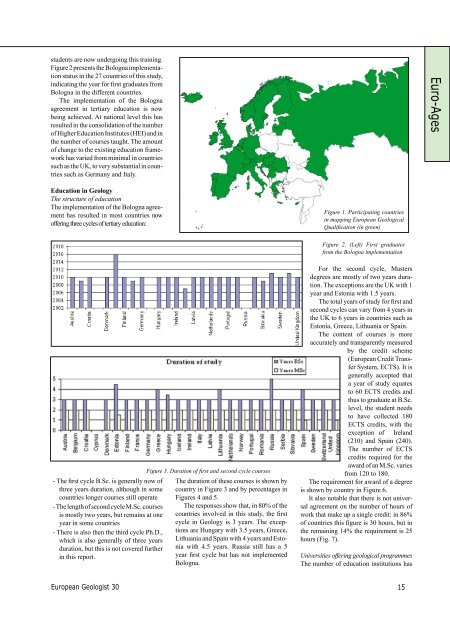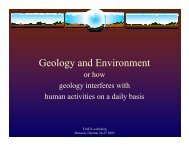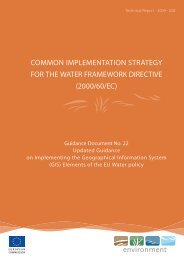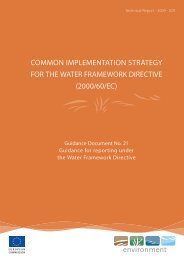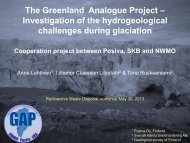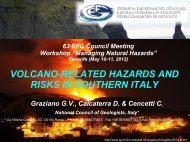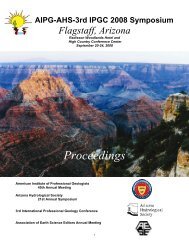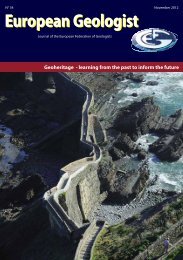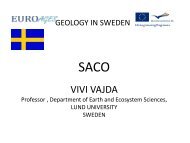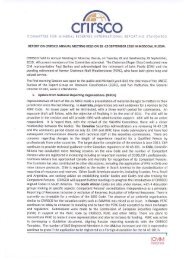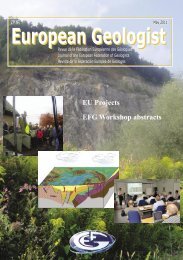Euro-AgesMapping the <strong>European</strong> geologicalqualification<strong>European</strong> geologists sometimes askthemselves how their qualificationis related to similar qualifications inother <strong>European</strong> countries. The <strong>European</strong><strong>Federation</strong> <strong>of</strong> <strong>Geologists</strong> has triedto answer this and other questionson <strong>European</strong> qualification in Geologyunder Euro-Ages, a <strong>European</strong> projectfunded by the <strong>European</strong> Union, DGEducation and Lifelong Learning Programme.One <strong>of</strong> the first challenges <strong>of</strong>this project has been to map geologicalqualifications within the EU countries.The main data from this studyare presented in this article.by Dr. Isabel Fernández Fuentes 1 and David Norbury 2Les géologues européens se posentparfois la question de savoir à quoi correspondleur niveau de qualification parrapport à des qualifications comparables,délivrées dans d’autres pays européens.La Fédération Européenne des Géologuesa essayé de répondre à cette question et àd’autres interrogations touchant la qualificationdes géologues en Europe, à traversEuro-Ages, un Projet européen financé parl’Union européenne, le Programme pourl’Education et la Formation, tout au long dela vie. L’un des premiers défis de ce projeta consisté à recenser les qualifications engéologie pour chaque pays européen. Cetarticle présente les principaux résultatstirés de cette étude.Los geólogos europeos a veces sepreguntan en qué medida su títuloacadémico se relaciona con títulossimilares en otros países de Europa.La Federación Europea de Geólogosha tratado de responder a esta y otrasinquietudes sobre las titulacioneseuropeas de geología con el proyectoEuro-Ages, un proyecto financiado porel Programa de Aprendizaje de porVida de la DG de Educación y Culturade la Comisión Europea. Uno de losprimeros retos del proyecto ha sidocartografiar las titulaciones geológicasen los países de la UE. Los principalesdatos de este estudio se incluyen eneste artículo.Over the past year, the partners in theEuro-Ages project have workedtowards developing a <strong>European</strong>qualification framework for geology, in thefirst and second cycles defined by the BolognaProcess, based on learning outcomesrather than input factors (course curricula).The objectives <strong>of</strong> the work are to increasetransparency <strong>of</strong> Earth Sciences qualificationsacross Europe and therefore to facilitateimproved academic and pr<strong>of</strong>essionalmobility across Europe. At the same time,the project aims to encourage students andgraduates in the field <strong>of</strong> geology, as well aspr<strong>of</strong>essional geologists, to pursue LifelongLearning. The project objectives are beingachieved through a structured exchange <strong>of</strong>best practices, expertise and characteristics<strong>of</strong> pr<strong>of</strong>essional practices in geology in thedifferent <strong>European</strong> countries. Importantreference points have been identified forquality assurance and related recognitionissues focused on learning outcomes. Theproject is supported by the <strong>European</strong> Commission,DG Education and Culture.One <strong>of</strong> the first steps was to map theexisting qualifications for geology informal, non-formal and informal settingsand to link these to national qualificationsystems. The <strong>European</strong> <strong>Federation</strong> <strong>of</strong> <strong>Geologists</strong>was the coordinator <strong>of</strong> this study.1EFG Office Director2Chairman, EFG Registration AuthorityA precedent <strong>of</strong> this study is the Reporton Education, Pr<strong>of</strong>essional Activity andRecognition <strong>of</strong> Qualifications, EFG Office,July, 2005. The objective <strong>of</strong> this documentwas to report on the status <strong>of</strong> Earth Scienceseducation and pr<strong>of</strong>essional training,with the aim <strong>of</strong> achieving the harmonization<strong>of</strong> Earth Sciences curricula, to informon general aspects <strong>of</strong> Earth Sciences pr<strong>of</strong>essionalactivities, to establish the map <strong>of</strong>different specialties and to promote the recognition<strong>of</strong> qualifications and the mobility<strong>of</strong> pr<strong>of</strong>essionals. The data analyzed in thisreport were derived from a questionnaireon education and training that was sent tothe EFG National Associations.The present article is based on the reportfor <strong>European</strong> Accredited Geological StudyProgrammes, Euro-Ages project, 2010.The data come from the summary reportsproduced by 27 <strong>European</strong> Countries:Austria, Belgium, Croatia, Cyprus, Denmark,Estonia, Finland, France, Germany,Greece, Hungary, Iceland, Ireland, Italy,Latvia, Lithuania, Netherlands, Norway,Portugal, Romania, Russia, Serbia, Slovakia,Spain, Sweden, Switzerland andUnited Kingdom (Fig. 1).Each country has produced a summarywith the following structure:- Status <strong>of</strong> implementation <strong>of</strong> Bolognaprocess- Education in Geology, including;•The structure <strong>of</strong> education•Universities <strong>of</strong>fering geological programmes•Number <strong>of</strong> freshman students andgraduates in the country- Learning outcomes;•Definition <strong>of</strong> learning outcomes•Academic and pr<strong>of</strong>essional learningoutcomes and competence pr<strong>of</strong>iles forstudy•Programmes in geology•Example <strong>of</strong> programme structure foreducation- Pr<strong>of</strong>essional input to course structure- Teaching course accreditation systems.The full report with the 27 summary countriesis available on the Euro-Ages Projectwebsite, <strong>European</strong> Accredited GeologicalStudy Programmes, Euro-Ages project,2010.This article is focused on the implementation<strong>of</strong> the Bologna Process, educationin geology, pr<strong>of</strong>essional prerequisiteand accreditation systems. The LearningOutcome is presented in this magazine(p. 19).Status <strong>of</strong> implementation <strong>of</strong> the BolognaProcessIn most <strong>European</strong> counties the establishment<strong>of</strong> education in accordance with theBologna process is well advanced. Mostgeology degree courses have switched tothe three cycle style <strong>of</strong> courses and the first14 <strong>European</strong> Geologist <strong>30</strong>
students are now undergoing this training.Figure 2 presents the Bologna implementationstatus in the 27 countries <strong>of</strong> this study,indicating the year for first graduates fromBologna in the different countries.The implementation <strong>of</strong> the Bolognaagreement in tertiary education is nowbeing achieved. At national level this hasresulted in the consolidation <strong>of</strong> the number<strong>of</strong> Higher Education Institutes (HEI) and inthe number <strong>of</strong> courses taught. The amount<strong>of</strong> change to the existing education frameworkhas varied from minimal in countriessuch as the UK, to very substantial in countriessuch as Germany and Italy.Euro-AgesEducation in GeologyThe structure <strong>of</strong> educationThe implementation <strong>of</strong> the Bologna agreementhas resulted in most countries now<strong>of</strong>fering three cycles <strong>of</strong> tertiary education:Figure 1. Participating countriesin mapping <strong>European</strong> GeologicalQualification (in green)Figure 2. (Left) First graduatesfrom the Bologna implementation- The first cycle B.Sc. is generally now <strong>of</strong>three years duration, although in somecountries longer courses still operate- The length <strong>of</strong> second cycle M.Sc. coursesis mostly two years, but remains at oneyear in some countries- There is also then the third cycle Ph.D.,which is also generally <strong>of</strong> three yearsduration, but this is not covered furtherin this report.Figure 3. Duration <strong>of</strong> first and second cycle coursesThe duration <strong>of</strong> these courses is shown bycountry in Figure 3 and by percentages inFigures 4 and 5.The responses show that, in 80% <strong>of</strong> thecountries involved in this study, the firstcycle in Geology is 3 years. The exceptionsare Hungary with 3.5 years, Greece,Lithuania and Spain with 4 years and Estoniawith 4.5 years. Russia still has a 5year first cycle but has not implementedBologna.For the second cycle, Mastersdegrees are mostly <strong>of</strong> two years duration.The exceptions are the UK with 1year and Estonia with 1.5 years.The total years <strong>of</strong> study for first andsecond cycles can vary from 4 years inthe UK to 6 years in countries such asEstonia, Greece, Lithuania or Spain.The content <strong>of</strong> courses is moreaccurately and transparently measuredby the credit scheme(<strong>European</strong> Credit TransferSystem, ECTS). It isgenerally accepted thata year <strong>of</strong> study equatesto 60 ECTS credits andthus to graduate at B.Sc.level, the student needsto have collected 180ECTS credits, with theexception <strong>of</strong> Ireland(210) and Spain (240).The number <strong>of</strong> ECTScredits required for theaward <strong>of</strong> an M.Sc. variesfrom 120 to 180.The requirement for award <strong>of</strong> a degreeis shown by country in Figure 6.It also notable that there is not universalagreement on the number <strong>of</strong> hours <strong>of</strong>work that make up a single credit: in 86%<strong>of</strong> countries this figure is <strong>30</strong> hours, but inthe remaining 14% the requirement is 25hours (Fig. 7).Universities <strong>of</strong>fering geological programmesThe number <strong>of</strong> education institutions has<strong>European</strong> Geologist <strong>30</strong>15


